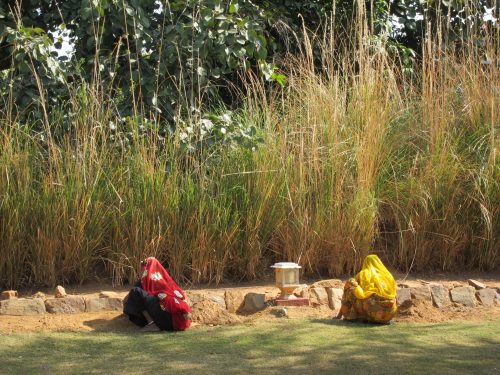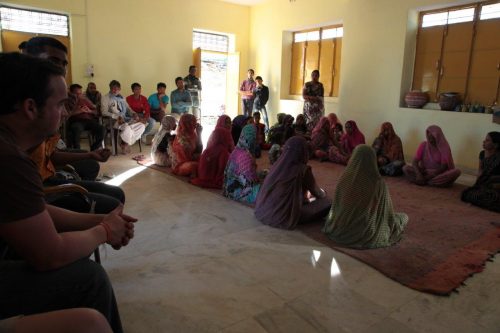“Don’t tell my husband I touched a white man” — our interpreter, Rajat, speedily translated the language of a woman farmer in a field in rural Rajasthan, India. She had quickly recoiled after her initial interest. It was suggested that she had probably never been this close to a white person before. Rajat, in his early 20’s, a man intent on joining the Indian Army, went on to chastise me for touching another man’s wife.
But first let me give this story context. I am writing this report as I return on a flight from Delhi to London. I led a group of volunteers, average age in their early 30’s, from Softchoice Canada to a small village in India where the group was supporting a local NGO. The project was to build a new lab and install computers providing access to technology where almost none existed.
As a team leader for groups volunteering in far away places I always suggest my group members follow their curiosity. Experience has shown this to yield some interesting experiences. This trip turned out to be no different.
While working on the construction of a building meant to be the home of the computer lab, I noticed a group of farmers huddled around a machine throwing off a blizzard of straw. It was harvest time. It turned out to be mustard seed, which had been drying in the field and was ready to be separated from the stalk. I took a few team members with me and we trudged into the adjacent field to learn more about what they were doing.
Several women were crouched below the right side of the machine catching the mustard seed in some plastic pans. As the pans filled up they transferred the contents to some big sacks ready for transport. One man in the crew was operating the machine while another man and a couple of other women pushed the dried stalks into the business end of the thrasher. We tried to talk to them but they knew no English and we knew no Hindi.
The curiosity of two women, I estimate to be in their 40’s, got the better of them and they were staring at me intently. I decided to break the barrier and held out my hand to them. One shook my hand quickly and then, with hands covering their mouths, they moved away while talking excitedly. That is when our interpreter who had just arrived gave me the play-by-play.
It turns out that Rural Rajasthan maintains very rigid roles and expectations for men and women. One night we were invited to a dinner that was held outside at a farmhouse and we were asked to go to the buffet line first, quickly followed by the local men, and finally by the women. It was then that I noticed almost no interaction or socializing between the sexes.
As guests of Jatan Sansthan, a local NGO in Udaipur, Rajsamand and Railmagra (where we were building the computer lab) we were invited to several meetings, two of which were women’s Panchayat (local government) gatherings. The women leaders of Jatan Sansthan are providing local empowerment training for women in this region. The topic that was being discussed wherever we went was Violence against Women. We were asked if we had this problem in Canada and of course we had to admit that it is still an issue in our home country. But the surprise was how much this, the Caste System, and fetal infanticide was all they wanted to talk about. Did we have a caste system in Canada? Did we have arranged marriages? Did we allow for sex selection in the womb? And, what would happen if a man beat his wife? Part of the function of the Panchayat gatherings is to settle local disputes resulting in more than 95% of issues not being referred to the legal system.
Perhaps more surprising were the questions we were asked by the intended beneficiaries of the computer lab. These children were between the ages of 8 and 13. We were asked about sex selection in the womb. We were asked about child marriages. We were asked if Canada had a caste system. It was astounding that children at this age were active in questioning if not discussing these “adult” issues. Is it a leap to think that this future generation, coming from the poorest part of rural India, is primed to lead change in this country?
As foreigners travelling to India the question on our minds was about the high profile rape cases featured prominently on the news even in Canada. On our last night in India several team members were engaged in a conversation with a woman from Jatan Sansthan named Latika. She linked the problem of rape to what we had experienced in that field in rural Rajasthan. Women are property. Women are expected to dress in a very modest manner. Women are expected to know their place and not talk to other men. A women who dresses in a western manner, or stays out late, or is seen in an establishment that serves alcohol, is asking for it. And there it was! While the standards are different in Canada the issue is the same. A woman who dresses provocatively is asking for it and deserves what she gets.










